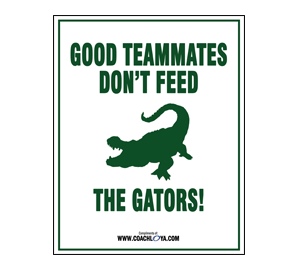If you spend any length of time in Florida, you will inevitably encounter an alligator. In fact, the occurrence is so common that warning signs are posted around communities with the intention of reducing the frequency of the encounters.
One of those such signs is posted by the lake in my community.
It offers two bits of sound advice:
1. No swimming.
2. Do not feed alligators.
If you spend any length of time on a team, you will inevitably encounter an alligator of your own—a toxic teammate. When you do, I recommend you heed the same advice that is on the aforementioned sign:
1. No swimming.
2. Do not feed alligators
Obviously, swimming in alligator infested water, or any body of water that has even a single alligator in it for that matter, is a dangerous endeavor. You’re putting yourself at risk for serious bodily harm by entering the water.
In regards to toxic teammates, No swimming means don’t get involved with them. If you allow yourself to succumb to the same negativity, apathy, and malcontent as the toxic teammates, they will devour your enthusiasm and your team spirit with the same ferocity as an alligator attacking a swimmer.
Sometimes alligators can be hard to spot. They can hold their breath underwater for a considerable amount of time. In some cases, it can be as long as one hour. Even when they are not completely submerged, alligators typically expose only the very tip of their noses above the waterline.
Just because you don’t see them right away, doesn’t mean they are not in the water, lurking beneath the surface, waiting to attack. The same is true of toxic teammates. The best way to avoid the attack is to not go in the metaphorical water.
This brings us to the rule about not feeding the gators.
When humans feed alligators, they tend to draw the alligators out of the water. In which case, it doesn’t matter if you go swimming or not, the danger of the alligator will come to you.
Toxic teammates are constantly searching for sources of malcontent. As the saying goes, misery loves company. When you do anything but disagree with a toxic teammate’s dissatisfaction, you are feeding their toxicity.
Just like the alligators, toxic teammates will grow increasingly bolder and less fearful if they sense the availability of an easy source of food. This is why you cannot allow them to think you are anything but loyal to your team and its leadership.
An old wives’ tale suggests you can escape an alligator chasing you on land by running in a zig-zag pattern. But it is just that—an old wives’ tale. It’s not really true.
Trying to escape the clutches of a toxic teammate by running in a zig-zag patter, i.e. gingerly dancing around the issue with noncommittal statements, doesn’t work either. At best, it just temporarily stays off the toxicity. You must be definitive in your stance and make your loyalty to your team abundantly clear.
Alligators have very small brains and are believed to be incapable of abstract thought. Their reptilian brain allows them to only think about meeting their primary individual needs, like eating. Toxic teammates think the same way. They are capable of only seeing things in terms of what is best for them, not what is best for their team.
Good teammates don’t swim with the gators on their team, and they don’t feed them either, because they think in terms of what is best for the team.
As always…Good teammates care. Good teammates share. Good teammates listen. Go be a good teammate.
*Did you like this post? FYI, you can download our “Don’t Feed the Gators” poster for FREE here.







Had a schoolmate threaten to punch my lights because I out hustled and outplayed him.Told him you start it,I ‘ll finish it!
Saw athletes that were team captains fade & hide when game on line.I hated to lose.I was a game changer whom my mates looked to for transition to many outstanding prep wins by our teams.Heart,courage, and grit overwhelm toxic mates.Leave em in dust!